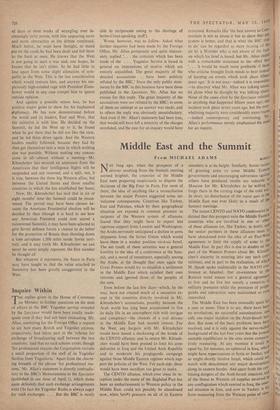Middle East and the Summit
From MICHAEL ADAMS 110 The net result of these anxieties was general hostility to the idea of a conference at the Sum- mit, and a mood of resentment, especially among the Arabs, at the thought that once again the Great Powers would try to establish a settlement in the Middle East which satisfied their own interests and ignored those of the peoples of the area.
Even before the last few days—which, by the way, have not created much of a sensation ex- cept in the countries directly involved in Mr. Khrushchev's accusations, possibly because the Arab world has long been accustomed to live its daily life in an atmosphere rich with intrigue and conspiracy—the chances of a real detente in the Middle East had seemed remote. For the West, any bargain with Mr. Khrushchev would have meant a slackening of the bonds of the CENTO alliance; and in return Mr. Khrush- chev would have been pressed to limit his arms deliveries to Iraq and the United Arab Republic and to moderate his propaganda campaign against those Middle Eastern regimes which sup- port the policies of the West. For each side, these would have been sacrifices too great to make.
The CENTO alliance, which ever since its in- ception under the name of the Baghdad Pact has been an embarrassment to Western policy in the Middle East, could not gossibly be abandoned now, when Sov,4'3 pressure on all of its Eastern members is at its height. Similarly, Soviet tactics of granting arms to some Middle Eastern governments and encouraging subversion against others have produced results too valuable to Moscow for Mr. Khrushchev to be willing t° forgo them in the coming stage of the cold war. In short, no disturbance of the status quo in the Middle East was ever likely as a result of the Summit meetings. The recent CENTO and NATO conferences le' dicated that this prospect suits the Middle Eastern countries who are Involved in one or other of these alliances (or, like Turkey, in both), and the senior partners in these alliances • seem t° have abandoned even the idea of an East-West agreement to limit the supply of arms to the Middle East. In part this is due to doubts on the part of the Western Powers about Mr. K brush' chev's sincerity in entering into any such corn- mitment, and in part to the realisation, of which M. Spaak spoke realistically in the NATO ference at Istanbul, that co-existence in Russian mind means not a general agreement to live and let live but merely a cessation of military pressures while the pressures of proPa" ganda and subversion were maintained or even intensified.
The Middle East has been unusually quiet for a year or more. That is to say, there havean no revolutions, no successful assassinations. and only one major incident on the Arab-Israeli bor. ders. But none. of the basic problems have been resolved, and it is only against the nerve-racked background of the last four years that the present unstable equilibrium in the area seems comp tively reassuring. At any moment it could be upset by, for instance, an upheaval in Iraq, which, might have repercussions in Syria or Jordan, an so might shortly involve Israel, which could not watch with detachment any major development of the threat to Western oil supplies involvedtn' along its eastern border. And apart from the 01 tinuing dangers of the Arab-Israeli situation, an any conflagration which centred in Iraq, the inter nal situation in Iran, and now in Turkey, is far from reassuring from the Western point of vies?;* The disturbances in Turkey during the NATO meeting were so damaging to the moral position Of the West on the eve of the Summit meeting that it Was difficult to believe the British and American delegations when they denied that there had been any discussion during the conference of Turkey's internal affairs (some of the other Western European representatives found difficulty In maintaining this 'hear no evil, see no evil' attitude). As a member rt. both NATO and CENTO, Turkey is of value to the West for its staunch anti-Communism and its splendid fight- ing reputation. But if it is to become a moral liability to both alliances because of Mr. Men- deres's conviction that he and only he should stay at the helm, then the West will have more difficulty than ever in persuading the peoples of the Middle East to join the Western world.







































 Previous page
Previous page